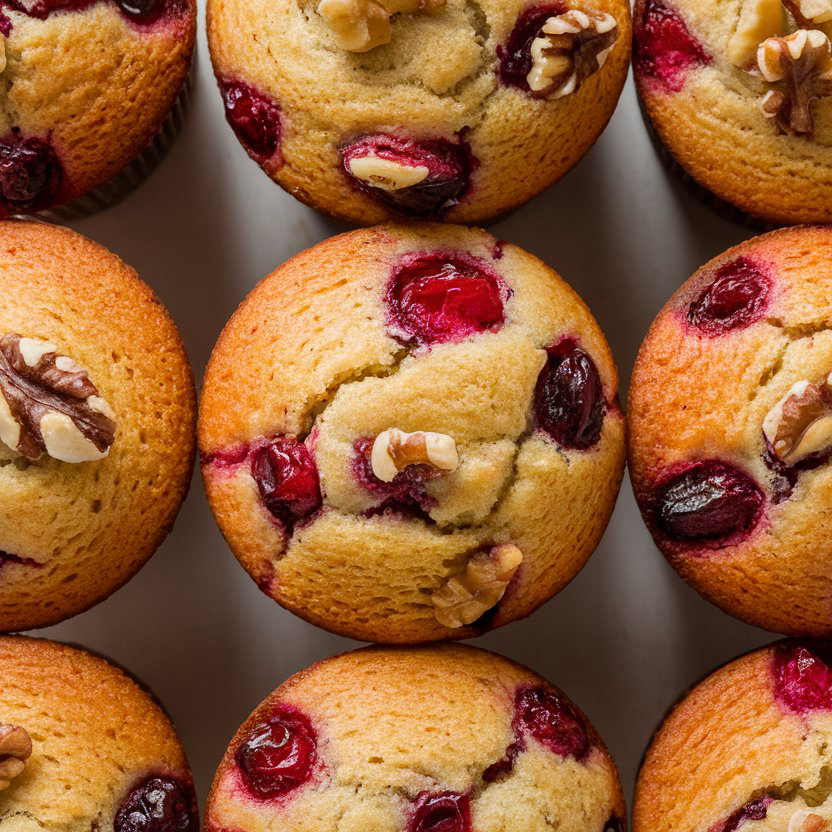When it comes to baking muffins, achieving a moist, tender texture is key to making them irresistible. Dry, crumbly muffins can be disappointing, but luckily, there are a few simple tricks and techniques that will help you bake muffins that are perfectly soft and moist every time. This guide covers everything from ingredient choices to baking techniques, helping you create delicious, moist muffins that will impress every time.
Key Ingredients for Moist Muffins
The first step in creating moist muffins is selecting the right ingredients. Each component plays a role in adding moisture, richness, and softness to the final product.
1. Fat: The Moisture Maker
Fats such as butter, oil, or yogurt are essential for moist muffins. They coat the flour particles, limiting gluten development and resulting in a soft, tender texture.
- Butter adds richness and flavor but can sometimes result in slightly denser muffins.
- Oil produces muffins that are lighter and stay moist for longer because oil remains liquid at room temperature.
- Yogurt or sour cream adds a tangy flavor while keeping the muffins moist due to their high-fat content.
To explore the difference in fat choices, check out this Ultimate Guide to Muffins, which details how different fats affect the texture.
2. Liquid: A Key to Softness
Liquids like milk, buttermilk, and sour cream are essential for creating a moist batter. The right amount of liquid helps hydrate the flour, creating a soft crumb.
- Buttermilk is an excellent choice because it adds acidity, which tenderizes the gluten, resulting in a soft and fluffy muffin.
- Sour cream provides both richness and moisture, making it a fantastic ingredient for moist muffins.
3. Eggs: Structure and Moisture
Eggs serve multiple purposes in baking. They help bind ingredients together while also adding moisture. The fat in egg yolks contributes to the softness of muffins, while the egg whites provide structure.
4. Sugar: Sweetness and Moisture Retention
Sugar doesn’t just add sweetness—it also helps retain moisture in muffins. This Sugar interacts with the liquids in the batter to keep the muffins from drying out. This is one reason why muffins with higher sugar content often feel moister.
The Science Behind Moisture Retention in Muffins
The secret to moist muffins lies in how the ingredients interact and how they are prepared. Each ingredient plays a role in retaining moisture, but the techniques you use during the baking process are just as important.
The Muffin Method
The muffin method is a mixing technique that prevents overworking the batter, which can cause dryness. It involves mixing the dry ingredients in one bowl, the wet ingredients in another, and then gently folding them together. Overmixing can lead to tough muffins because it activates the gluten in the flour.
By gently combining the wet and dry ingredients, you reduce gluten formation, leading to softer, moister muffins. Learn more about this method in the How to Make Muffins Moist and Fluffy guide.
Ingredient Temperature
Using room temperature ingredients is another key to achieving moist muffins. Cold ingredients can cause the batter to become lumpy, which results in uneven baking. Room temperature eggs, milk, and butter will mix more smoothly, helping the muffins rise properly and retain their moisture.
Secrets to Avoiding Dry Muffins
No one wants dry muffins, but there are a few common mistakes that can lead to them. Here are some tips to avoid those pitfalls and bake perfectly moist muffins every time.
1. Don’t Overmix the Batter
As mentioned earlier, overmixing activates gluten, which can lead to tough, dry muffins. Stir the batter just until the dry ingredients are incorporated—this will help create a tender crumb.
2. Check the Baking Time
Muffins can become dry if they’re overbaked, so it’s crucial to keep a close eye on them. Baking muffins for too long can cause them to lose moisture, leading to a dry texture. Bake them until a toothpick inserted into the center comes out clean or with a few crumbs.
- Use a kitchen timer and start checking the muffins a few minutes before the recommended baking time is up to avoid overbaking.
3. Add Extra Moisture-Boosting Ingredients
In addition to using the right fats and liquids, you can enhance the moisture in your muffins by adding applesauce, mashed bananas, or even grated zucchini. These ingredients not only add moisture but also give your muffins a natural sweetness and flavor boost.
- Adding a spoonful of honey or maple syrup can also help keep muffins moist for longer.
Moisture-Boosting Ingredients You Can Add
Adding moisture-boosting ingredients to your muffin batter can make a significant difference. Here are some popular choices that will keep your muffins soft and moist:
1. Applesauce
Applesauce is an excellent replacement for some of the fat in muffin recipes. It provides moisture without adding too many calories and gives the muffins a mild sweetness.
2. Mashed Bananas
Mashed bananas work similarly to applesauce and are particularly great in muffins like banana nut or chocolate chip. They add moisture and natural sweetness.
3. Greek Yogurt or Sour Cream
Greek yogurt or sour cream adds a tangy flavor and a creamy texture that makes muffins moist and tender. These ingredients are rich in fat, which helps lock in moisture during baking.
Techniques for Ensuring Moist Muffins
In addition to choosing the right ingredients, the baking process itself plays a crucial role in ensuring moist muffins. Here are some tried-and-true techniques:
1. Chilling the Batter
One secret to creating moist muffins is chilling the batter before baking. Letting the batter rest in the fridge for 30 minutes to an hour allows the ingredients to hydrate, which can result in a more tender texture.
2. Using Room Temperature Ingredients
Using room temperature ingredients ensures that the batter mixes evenly, resulting in a more uniform texture and better moisture retention. Cold ingredients can cause the fat to clump, leading to uneven baking.
Common Muffin-Making Mistakes to Avoid
1. Overfilling Muffin Tins
Overfilling the muffin tins can cause the edges to dry out before the center is fully cooked. Fill the tins about ¾ full to ensure even baking and a moist texture throughout.
2. Using Too Little Fat
Fat is crucial for moisture. Muffins made with too little fat will turn out dry and crumbly. Make sure to use the full amount of fat called for in the recipe, whether it’s butter, oil, or yogurt.
3. Inaccurate Measuring of Ingredients
Baking is a science, and measuring ingredients accurately is critical. Using too much flour can dry out your muffins. Always spoon flour into the measuring cup and level it off with a knife to avoid packing in too much.
Healthy Moist Muffin Variations
If you want to make your muffins a little healthier without sacrificing moisture, here are some ideas:
1. Whole Wheat Flour
Using whole wheat flour instead of all-purpose flour can add fiber and nutrients to your muffins. To maintain moisture, try using a 50/50 blend of whole wheat and all-purpose flour.
2. Honey or Maple Syrup as Sweeteners
Instead of refined sugar, you can use honey or maple syrup for a more natural sweetness that will also help retain moisture.
3. Vegan Moist Muffins
For a vegan version of moist muffins, substitute flax eggs for regular eggs and use coconut oil instead of butter. These swaps will still keep your muffins soft and tender.
Recipes for Moist Muffins
Here are some tried-and-true recipes that incorporate the tips for ensuring moist muffins:
1. Blueberry Muffins
For moist blueberry muffins, consider using buttermilk to keep them tender. This Moist Blueberry Muffins Recipe is a perfect example of how buttermilk adds richness and moisture.
2. Chocolate Chip Muffins
Adding Greek yogurt or sour cream to the batter makes for incredibly moist chocolate chip muffins. The extra fat ensures the muffins stay soft and tender.
3. Banana Nut Muffins
Mashed bananas naturally keep banana nut muffins moist. The bananas add moisture and sweetness, making this a perfect option for breakfast or a snack.
FAQs: Moist Muffins
Why are my muffins always dry?
Dry muffins are often the result of overmixing, overbaking, or not using enough fat in the recipe. Avoid these mistakes by stirring the batter gently and baking the muffins just until they are done.
How do I keep muffins moist for longer?
To keep muffins moist, store them in an airtight container at room temperature. You can also wrap them individually in plastic wrap to lock in moisture. For longer storage, freeze the muffins and reheat them when needed.
What ingredient makes muffins moist?
Ingredients like oil, yogurt, and applesauce all help make muffins moist. These ingredients add richness and prevent the muffins from drying out.
Can I use oil instead of butter for moister muffins?
Yes, oil often results in moister muffins than butter because it remains liquid at room temperature, helping the muffins stay soft.
Do I need to add fruit or vegetables to keep muffins moist?
Adding fruit like bananas or zucchini can boost moisture, but it’s not always necessary. The right balance of fat and liquid will keep your muffins moist without extra ingredients.
Conclusion: The Final Secret to Moist Muffins
The secret to moist muffins lies in the combination of the right ingredients and techniques. Choosing the right fat, using enough liquid, and avoiding overmixing are all critical steps. Whether you’re adding applesauce, Greek yogurt, or just sticking to a classic recipe, with the right tips, you’ll be able to bake muffins that are moist, tender, and delicious every time.
Experiment with these methods and recipes to discover your perfect moist muffin!

